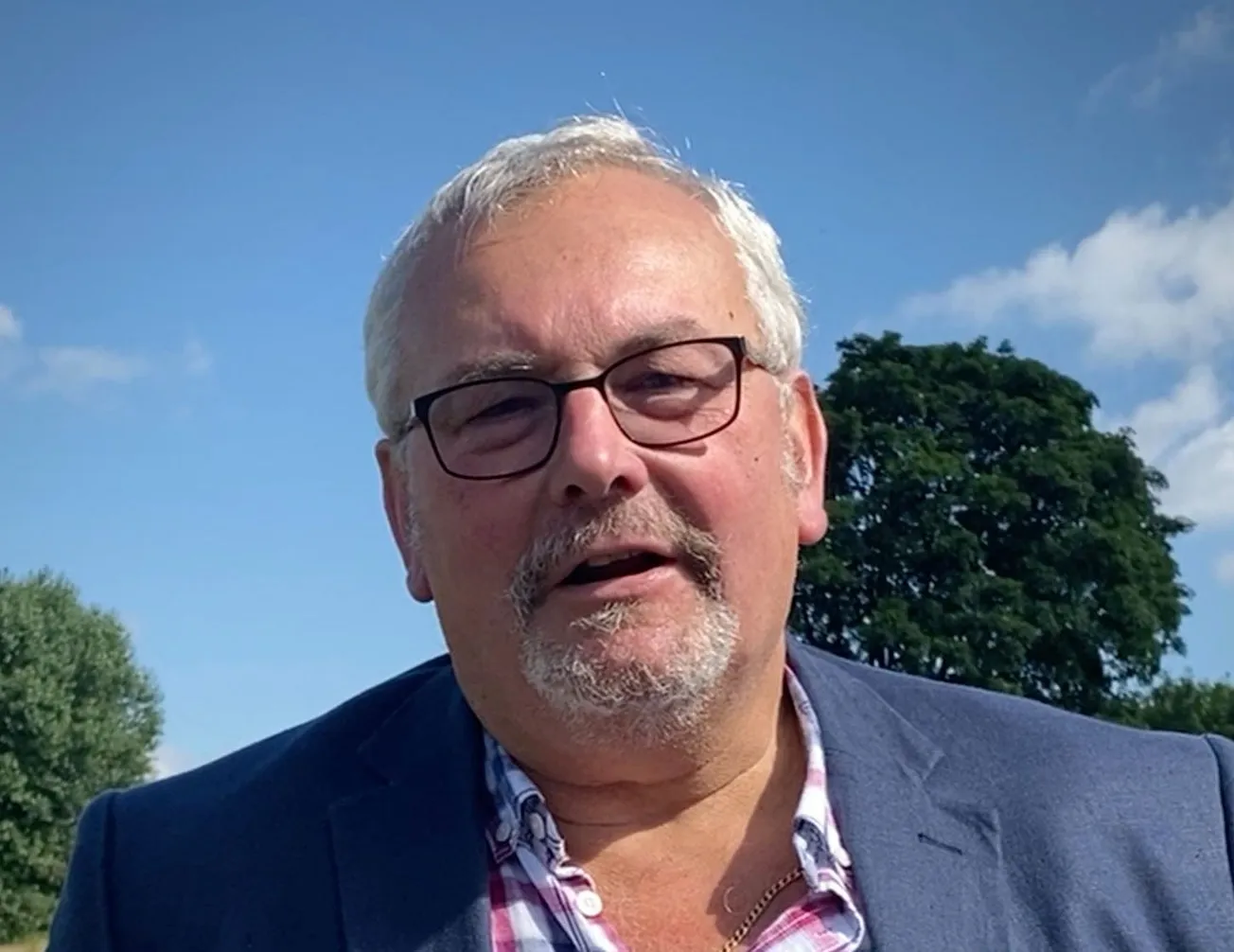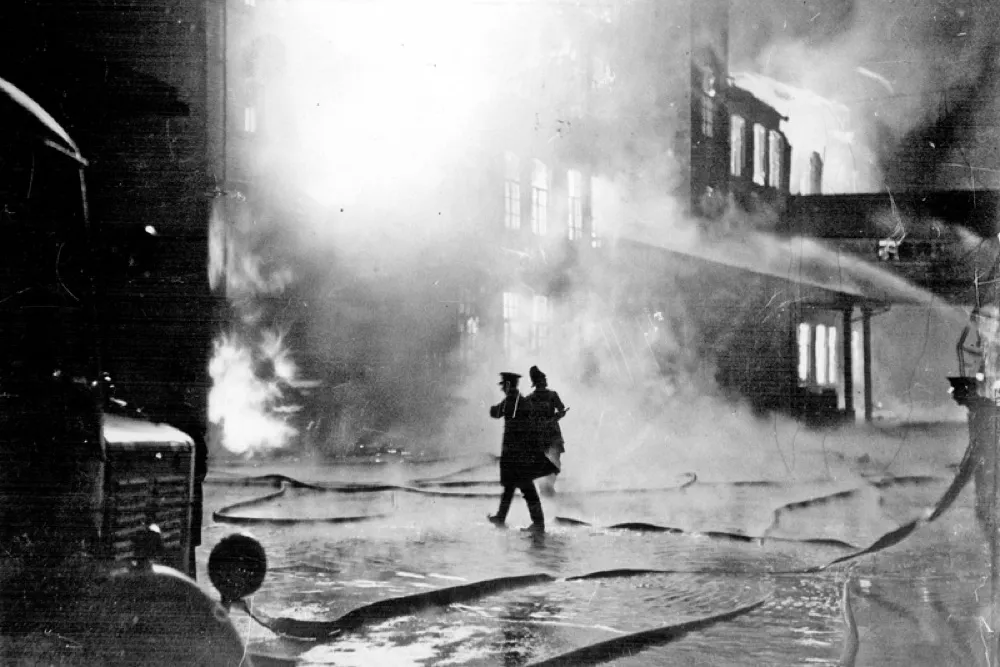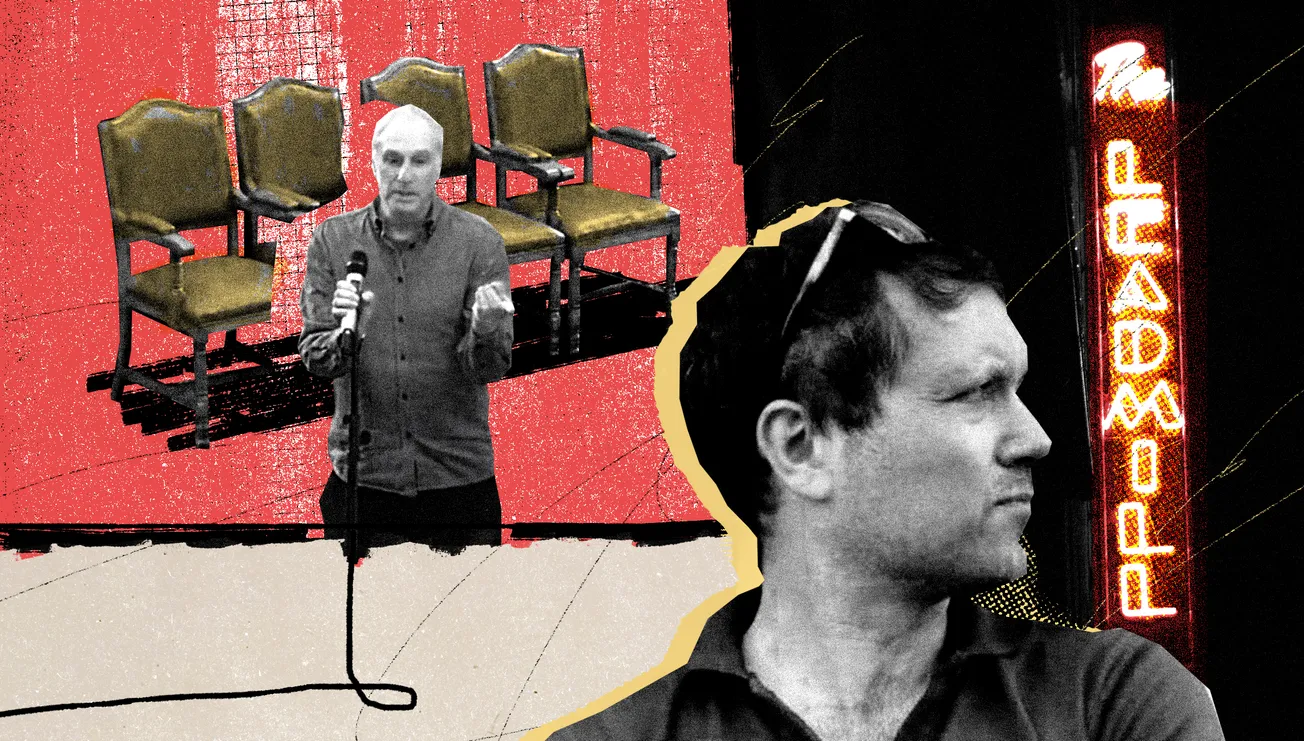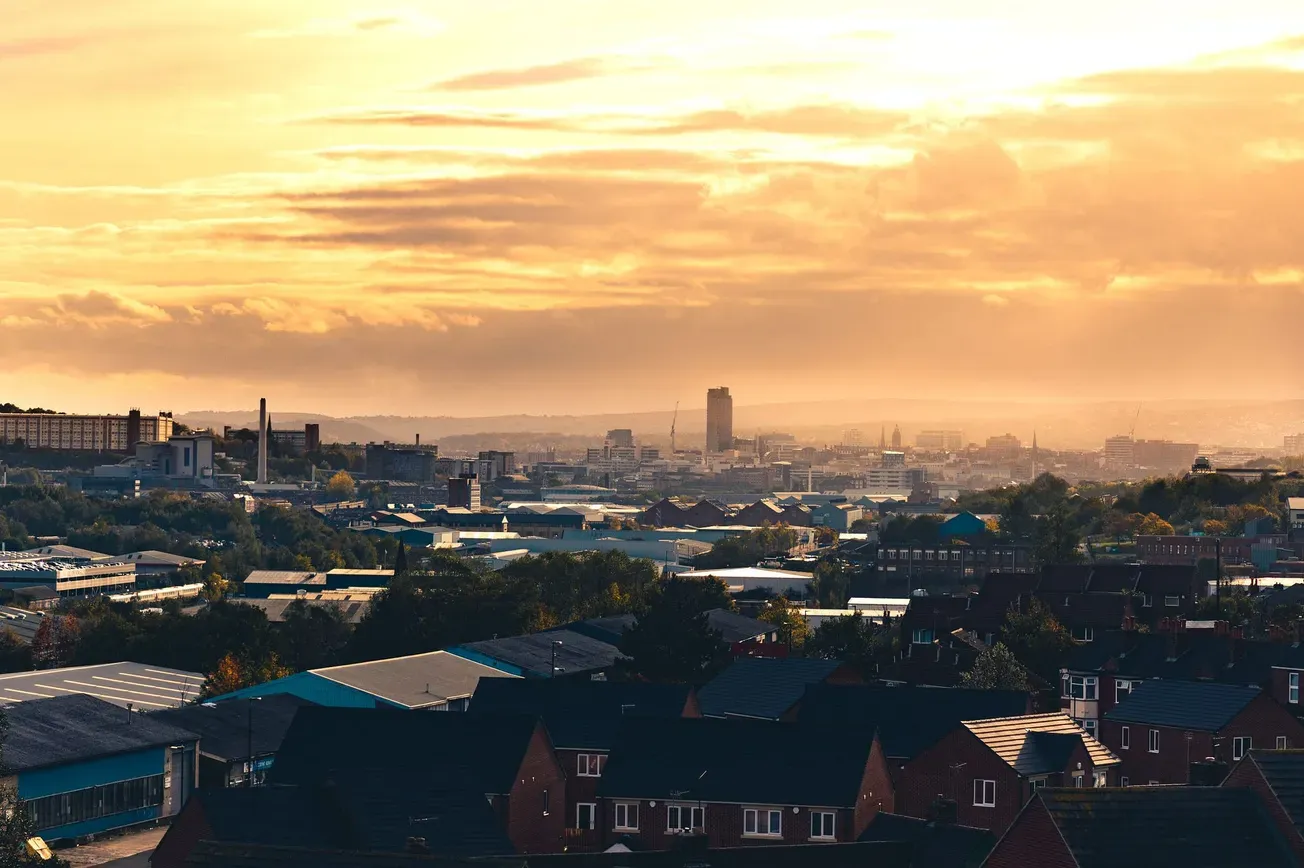On shaky, hand-held mobile phone video footage, council leader Terry Fox emerges from the University of Sheffield’s Octagon building flanked by fellow Labour councillors. He’s smartly dressed in a dark suit and white shirt, incongruously paired with a bright red scarf and flat cap. A council meeting has been due to take place in the venue but a strike by university staff has thrown a spanner in the works.
Fox tries to reason with the crowd, explaining they’ve decided not to take part in the meeting in solidarity with the strikers, but it doesn't wash. “You’ve already crossed our picket line, you scab,” one masked man can be heard shouting on the film. Within seconds the two men are up in each other's faces. “Do not ever use that word with me, my friend,” shouts Fox. When fellow councillor Tony Damms pulls the man’s face covering down, the situation looks like it could get nasty. Then bystanders quickly move in to keep the men apart.
The confrontation, which took place on December 2 last year, is one of the first things I ask Fox about in an interview we’ve been waiting to have with him for several months. We’re speaking over a Microsoft Teams call, him in the Town Hall and me less than a mile away in my Park Hill flat. He’s changed his video call background to show the bright green police box which stands outside the Town Hall on Surrey Street. I get the impression there may be others in the room, but I never see them.
Fox admits the picket line row was a “massive cock-up from start to finish”, but says he wasn’t prepared to let the scab comment go. “I’m only human,” he tells me. “To see someone fling words like that around in a loose way in this city is something I will not tolerate.”

It's a strange thing to hear a democratically elected politician say — that he won't tolerate a protestor using a particular form of words. Fox says the comment brought back memories of his own time out on strike in the 1980s. He witnessed fellow miners have to return to work as they had no other choice. “I’m from a different generation and we reacted the way we did,” he tells me. “Maybe one day I can sit down with him and tell him about my recollections of my time on strike and he can tell me about his. But this new generation has no idea about what it was like.”
His past as a miner is a matter of record, but Fox’s life before that is less well known. His early childhood was spent on East Bank Road in Arbourthorne, a stone’s throw from the Manor Castle ward he now represents on Sheffield City Council. His mother died when he was four and his dad passed away six years later, leaving him orphaned at the age of 10. He then moved around various children’s homes until he was 16 before moving in with his sister on the Wybourn estate.
He says he doesn’t like “shouting about” his background. “My sisters went through exactly the same thing so I am nothing special,” he says. “There are people with far worse lives than me.” When the time came to move out and get a job, like many of his generation he went down the pit, spending the next 30 years of his working life at various collieries including Orgreave, Maltby, Dinnington and Markham.
Fox, who speaks in a broad Sheffield accent, is actually my councillor, but this is the first time I’ve ever spoken to him. We joke about me using the interview to sort out Park Hill’s bins. He has the politician’s habit of answering questions he has just asked himself, but none of the polish or robotic discipline we associate with national political figures. Sometimes he veers off into answers that are difficult to make out, evoking the chaotic verbal delivery of John Prescott.

His involvement in Labour politics continued after the mines closed. He’s now been a councillor for 20 years, lives in Pitsmoor and is a regular sight in the pubs of his local area. “I eat with my community, drink with my community,” he tells me. “When I’m out people still come up to me and say my door isn’t hung right — get that sorted for me. I don’t get above my station.”
He went into last May’s local elections as deputy leader under former Hillsborough councillor Bob Johnson, only being appointed to the top job when Johnson unexpectedly lost his seat to the Greens. But as well as losing its leader, Labour also lost its majority, meaning the new leader was immediately plunged into coalition negotiations with opposition parties.
His first seven months have forced Fox to lead a major city through a pandemic while heading up the first coalition in Sheffield’s history. It took two weeks of intense negotiations with the Greens to thrash out the agreement and it hasn’t been plain sailing since (last week, Labour’s finance and resources cabinet member Cate McDonald and Green inclusive economy, jobs and skills cabinet member Paul Turpin openly argued with each other on Twitter).
But Fox is determined that their agreement with the Greens will last until the pre-election purdah period begins in March. “Have we fell out? Yes of course we have,” he says. “Does that mean we are going to get divorced, no. I have got a difference of opinion on Pinstone Street, Surrey Street, Barker’s Pool and Eccy Road to what [Green leader] Douglas has got. The Greens have priorities they want to get over the line and we have to compromise.”

That tensions exist between Labour and the Greens is no surprise. Fox was cabinet member for environment and transport when the Sheffield tree scandal was beginning, and several other Labour cooperative executive members were senior figures in Julie Dore’s administration. As a result of the coalition agreement they now sit round the cabinet table with people who were arrested during the protests.
Fox acknowledges people were “dubious” about him becoming leader because of his involvement in the previous administration. He says he bears the “scars on his back” from the tree protests and freely accepts that both he and the council made mistakes over the SCC Streets Ahead contract they signed with Amey in 2012. “It’s right that lessons are learned,” he says.
But as well as recent history, more fundamental differences exist between Labour and their coalition partners. Fox says that the “clear water” between them and the Greens is over the pace of change. “We have got to take people with us,” he says. “The sky isn’t going to fall in tomorrow because of climate change. We have got to accelerate but they want here and now whereas we want to take people along this journey at a more calculated pace.”
Chief among these disagreements is the pedestrianisation of the city centre, an issue that’s been rumbling on almost since the coalition was formed back in May. In July, Fox was quoted as saying he wanted to saw through “every bloody gate” that had been installed on Pinstone Street during the pandemic. He maintains he is not anti-pedestrianisation but says he just wants to be inclusive. “Let’s make people’s lives easier rather than harder,” he says. “Are we going to pedestrianise everything and not be able to get people into the city centre? Is that what we are trying to achieve here?” Asked whether he thinks there is a compromise solution, he sounds hopeful. “There is always a way round everything, isn’t there Dan?”
Last day today, extremely hard to leave the incredible colleagues who make up the covid taskforce, it has been an honour and a privilege to serve alongside them.
— Kate Josephs (@katejosephs) 6:47 PM ∙ Dec 18, 2020
Fox’s most pressing problem is the fate of the council’s chief executive Kate Josephs, after it emerged last month (after plenty of pressure from The Star) that she attended a Covid rule-breaking leaving party in the Cabinet Office in December 2020. He tells me he was “bitterly disappointed” when he heard of her involvement in the national scandal. “I’ve had hundreds of letters and emails about it so I know how people feel,” he says. “People have poured out their grief to me, re-living the experience of losing loved ones during the pandemic.” He tells me he personally remembers waving goodbye to his fellow Manor Castle councillor Pat Midgely as her hearse went by on City Road.
He says he can’t prejudge the investigations that are currently taking place into the row, either locally or nationally, but says that the committee investigating in Sheffield will see all those emails he’s seen. After the committee has reported, Josephs will have “to look in the mirror and see how she feels”, he says.
He seems torn. “I think Kate has been an asset to Sheffield and she is driving us in the direction we want to go,” he says. “Whether the city can forgive her is not for me to say. But whatever the outcome we have to build back — and we will do that with Kate or without her.”
Fox says he is trying to “repair Labour’s brand” after a bruising few years for the party in Sheffield. A few weeks after his appointment, he announced he would be going on “walkabouts” in all 28 wards of the city, his name bravely plastered across his back, to take the temperature of a city that had just decisively rejected Labour majority rule.

He’s now completed 18 and the visits have been a “gold mine” of local intelligence, including a few robust conversations along the way. “In my experience, Sheffielders will rip a layer off your skin and then offer you a custard cream,” he says.
The trips have highlighted the city’s stark inequalities. Some of the areas he visits have organisations with up to 150 volunteers whereas ones in his Manor Castle ward have to make do with just three. But the job of reducing inequalities within Sheffield has eluded generations of council leaders. “It really is an uphill slog,” he says. “We need massive help from the government.”
Sheffield is also trying to help itself, through the £450m Heart of the City project and a consultation which calls for an extra 20,000 homes to be built in the city centre. But the challenges remain enormous. At times, do the sheer amount of big decisions facing the city feel daunting, I ask. He thinks about it for a few seconds but quickly turns my question on its head: they’re actually a once in a lifetime chance to reshape its future. “Sheffield has a real opportunity here,” he tells me. “We can either sit around fighting about it or we can get on to make it happen.”
Read more:
The inside story of how the Sheffield Greens rose to power
'You are always thinking, can I trust them?'

Comments
Sign in or become a Sheffield Tribune member to leave comments. To add your photo, click here to create a profile on Gravatar.







